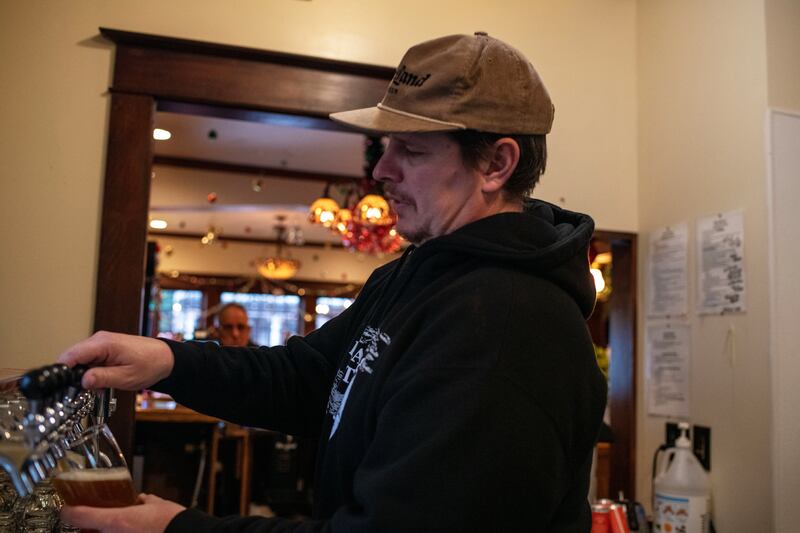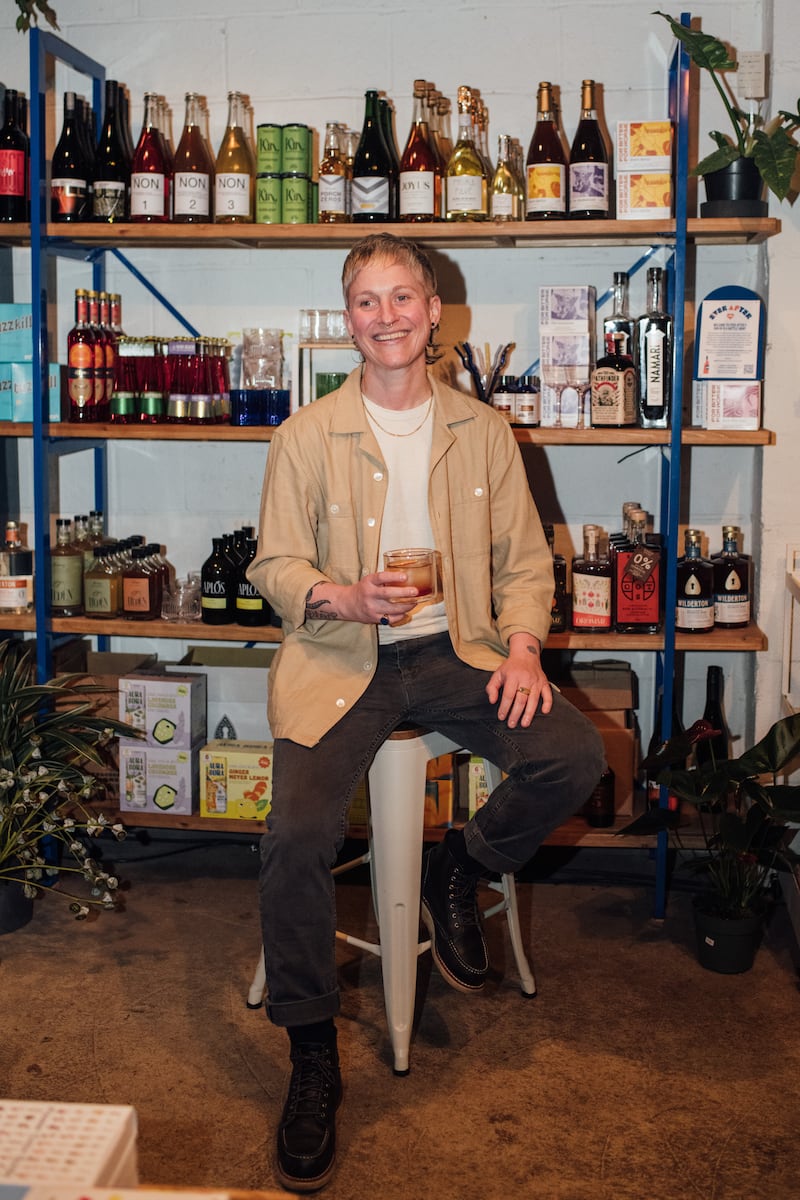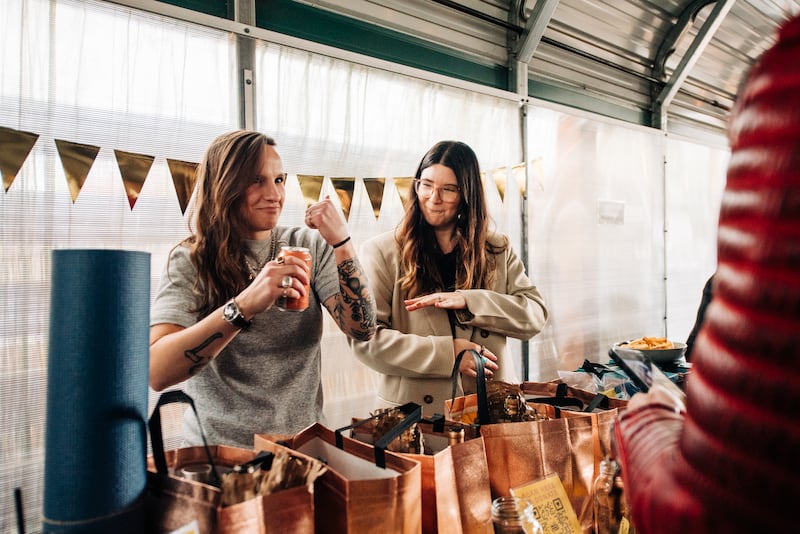It was a quiet night at ForeLand Beer on the Thursday before Christmas. Management had hung ornaments from the ceiling of the 1913 Craftsman house on Southeast Belmont Street at 25th Avenue and wrapped taps with tinsel. One couple played cards in a corner booth while a regular drank a pint by the fireplace on the front porch. The bar had a weak pulse this dark, rainy weekday evening when two tourists from Baltimore burst in half an hour before closing.
“Can we squeeze in a beer?” one of the newcomers asked. “We were sent here by someone who is really geeky about lagers. Is there time?”
Just barely. Beertender Anathea Meade poured two mugs and filled the couple in. ForeLand brews its beer in McMinnville but opened this Buckman taproom three years ago to assert a presence in the Portland beer scene. The brewery is known primarily for its classic German lagers and English-style cask ales.
“We’re actually closing,” she said. “New Year’s Eve is our last night.”
Co-owner David Sanguinetti says the timing was strategic: He didn’t think the bar could survive another Dry January.
Customers’ annual foray into sobriety—a month off from drinking handily aligned with New Year’s resolutions—has ballooned from a niche, coastal trend into an inescapable movement, with copycat months like Sober October and No Booze November.
Dry January has left traditional bars, breweries and bottle shops scrambling to recoup dollars that have walked out the door in search of a hangover-free month. (Last year was particularly brutal with the midmonth ice storm that shuttered businesses for days.)
“I don’t think people realize the very edge that so many of your local small businesses are living on day to day,” Sanguinetti says. “You might want to come back in February, and they won’t be there. And that’s not said enough.”
Sales numbers from the Oregon Liquor and Cannabis Commission confirm that ForeLand was not alone in experiencing a January drop-off. In December 2023, Oregonians spent $91 million on liquor. January 2024? A scant $57 million. This pattern holds for the six years of data that the state agency provided. Sales in a regular month without holidays like May also soared above January’s, with $69 million in sales in 2024.

OLCC sales numbers for cannabis follow a similar pattern of lifts each December ($82 million in 2023) and falls in January ($76 million in 2024), but not nearly as dramatic as those for liquor.
As some businesses suffer, a new industry is taking shape.
Local brands are popping up to sell a range of beverages to tempt the newly sober. Portland is home to Tropink’s canned CBD drinks, For Bitter For Worse non-alcoholic cocktails, and Heck’s 0.5% NA beers, among others. We’ve got Victoria, the vegan cocktail bar on North Albina Avenue, with its mocktail menu that rivals the length of the spirited one, if not the price. Two of our top chefs, Gabriel Rucker and Gregory Gourdet, have spoken publicly about their sobriety and offer extensive no-proof options at Le Pigeon and kann, respectively. BuzzCutt, the national app for finding NA products, was founded here; the owners say that “Portland was the perfect place to create something of this nature” because of our robust NA and tech scenes.
Swaths of Oregonians are cooling their relationship with alcohol, perhaps made easier with our access to cannabis and psilocybin. (Yes, being “California sober,” be it smoking weed or microdosing on shrooms from Jan. 1 to 31, technically counts as a version of Dry January.)
But who gets ahead and who gets left behind with this new buzz?
Dry January started in the U.K. in 2013 as a campaign by a charity called Alcohol Change UK that has grown into a global movement.
A full quarter of Americans aged 21 and over who typically drink participated in Dry January last year, according to a survey by market research firm Civic Science. That’s up from the 16% who participated in 2023. The numbers are highest for ages 21-24 (35%) and lowest for 55 and up (14%). Participants are known for raving about their high-quality sleep, clear skin and weight loss from the challenge to anyone in earshot, leading to an increasing number of eye rolls, too.
And it’s not just January, especially for Gen Z: According to a Gallup poll in August 2023, 62% of U.S. adults under age 35 drink alcohol, down from 72% two decades ago.
Tony Morse, a recovery advocate who unsuccessfully ran for Portland City Council last fall, is himself “doing permanent Dry Januarys,” he jokes. (He’s been sober since 2017.) He sees the uptick of drinkers being “sober curious” for health and wellness reasons as a positive societal change.
“I’m not here to tell people if they should drink or not, that’s not up to me,” Morse says. “But from a clinical standpoint, drinking less is healthier than drinking more. And that’s just science.”
But then there’s business.
Last year, Sanguinetti stocked the coolers with non-alcoholic options to get ready for throngs of sober customers who never showed. There were IPAs, stouts, hop waters, sours, zero-proof mojitos, cold-brew coffee, kombucha—pretty much anything he could think of. The inventory stuck around long past Jan. 31. Plus, the margins on NA drinks are notoriously terrible, he says, bringing in less than half the profit of regular brews.
Sales quantities are different, too.
“I’ve seen people go through three to four cans of Guinness 0, but for the most part it’s a ‘one and done’ situation,” Sanguinetti says.

And it’s not just a matter of white-knuckling it through Dry January. Sober October was just as bad for ForeLand and some other small businesses WW interviewed. (“We fell off a cliff,” Sanguinetti says.)
Paul Reiter, co-founder and CEO of Great Notion Brewing, says last January was “horrible” for business. The company, including seven taprooms across three states and a wholesale business, was down a combined $100,000 from the previous January.
He has some theories why people are drinking less in general, such as COVID turning people into homebodies. Plus, booze isn’t the only game in town anymore.
“There are more options to party and hang out with your friends and be social,” Reiter says. “Obviously, cannabis blew up and more and more people I know are taking mushrooms or microdosing and things like that. There’s a million CBD drinks. All those things are just alternatives or competitors to beer.”
This year, Reiter is making a few pivots. Since Great Notion can’t rely on its taprooms quite like it used to, the brewery is focusing on wholesale, where its numbers are soaring. He’s featuring four NA drinks this month, including two craft sodas and two non-alcoholic hop waters, which are like premium La Croix seltzers with hops and are “flipping delicious,” Reiter says.
Mom & Pop Wine Shop in the Roseway neighborhood closes for a week every January. That’s partly due to Dry January, but it’s also just a necessary break to take inventory after a busy December. On a rainy Friday afternoon in December, Telina Rohrer and Dan Kunnecke—the titular mom and pop—chatted about the upcoming Dry January while managing their tidy, bustling bottle shop. It was hard to picture an imminent slowdown as Rohrer and Kunnecke managed a newspaper interview, a post office run, a couple of customers, and signing for a wine delivery, all in half an hour. But they say it’s coming.
“You have a cadre of regulars you see every other week at a tasting event and suddenly they’re not here for a month,” Kunnecke says. “And then Feb. 1, everyone’s like, ‘We’re back!’”
Mom & Pop maintains a small NA section of products—a kombucha and two bottles of bubbles make the cut—though they’re not big sellers. NA beers are “way ahead” of NA wine in terms of quality, Kunnecke says.
Rohrer, who came up in the restaurant world in Chicago and locally at Andina and Trifecta, has a theory: Alcohol adds the body component of wine. Without something to keep the palate interested with some weight or richness, it gets bored.
“I kind of feel it’s like vegan chorizo or something,” she says. “Just eat vegan food! Don’t try to make chorizo. I’d rather just drink a beautiful tea or sparkling other beverage than try to have this approximation.”
Rohrer has never participated in either sober holiday—“I’m too much of a Gen Xer to follow what other people are doing,” she says—but has had long stretches of sobriety before. She wishes that customers would spread their teetotaling throughout the calendar so it won’t potentially tank small businesses that rely on steady cash flow to stay afloat.
“We do a bad job of normalizing somebody who doesn’t feel like drinking for whatever reason,” Rohrer says. “Why does it have to be this big production? The idea that Dry January is a thing is symptomatic of people not feeling comfortable doing whatever they need to do whenever the mood strikes.”
Dry January is only good news for some local businesses. Ever AFter is Portland’s first non-alcoholic bottle shop, a playground of fancy beers, wines, spirits and “functional beverages” with vitamins and herbs, none of which will take much edge off of a bad day at work (or leave you with a headache the next morning).
For now, the bottle shop is low on seating. As in, there is none. There’s no DJ, no bartender, no happy-hour nibbles, no customers this December weekday afternoon. It does smell amazing since Ever AFter is, for now, a pop-up inside of Colibri Flowers & Plants on Northeast Prescott Street. The bottle shop is really just four shelves and a refrigerator just past the cooler of Christmas greenery in the entrance.
Ariel Dunitz-Johnson, 44, launched Ever AFter (AF stands for “alcohol-free”) in May.

An illustrator by trade, Dunitz-Johnson pivoted to the non-alcoholic business world around this time last year, driven by a personal mission. They have been sober since 2019. “A lot of things led up to that happening,” they say, including the death of a dear friend making them realize they didn’t have many coping mechanisms other than booze. They never successfully completed a Dry January, which, in hindsight, might have been an indication that alcohol was becoming a problem.
But not drinking at all, especially in the queer community, felt lonely. Particularly in early sobriety, Dunitz-Johnson didn’t even want to be around drinking.
“If there’s a fancy zero-proof cocktail menu at a bar, you’re still around drinking,” they say. “If you go to an art gallery, you’re probably around drinking. I just stopped going out as much.”
Dunitz-Johnson had the idea for an alcohol-free social space with tastings, events, speakers, art shows—whatever people needed. They swirled the idea around for a while and, to their surprise, nobody else in town started an NA bottle shop first. When Ever AFter launched online in May, the reception was “remarkable,” they say. Indeed, the comments on Instagram were so ecstatic it seemed as if Dunitz-Johnson were about to deliver a cooler of beverages to a desert island:
“Ever AFter is exactly what Portland needs! Cannot wait.” “Okay, I am over the moon to hear about this!!” “Can we get a shirt STAT?!?! [fire emoji, fire emoji] Such smart & sexy branding! Truly genius.”
One person got straight to the point: “I can’t wait to give you my money.”
That part is possible now. Ever AFter is currently crowdfunding for a permanent brick-and-mortar location—the campaign stood at the time of reporting at about $50,000 or one-third of its $150,000 goal. Dunitz-Johnson admits they are “not a business person” and their goals with Ever AFter are not financial, beyond wanting to be able to hire people and pay their health insurance. They echoed Sanguinetti at ForeLand’s concern about weak margins for NA beverages: “It’s not big money.”
But Ever AFter could be a big payoff in other ways. Since going sober, Dunitz-Johnson has learned how to trust themself, live with integrity, and be in service to others. Ever AFter is a chance to help share with people some of the tools they’ve picked up “to learn how to live,” Dunitz-Johnson says.
“It’s none of my business if people quit drinking or not, or are trying Dry January or not,” they say. “What I do think is important is to create accessible spaces where people have somewhere to go and people have options.”
These abound for sober socialites on the app BuzzCutt, a giant store-finder for more than 40 NA brands at 150,000 bars and restaurants nationwide. The app is headquartered here, founded by North Portland married couple Olivia and Sarah Sears. As with Ever AFter and so many NA startups, the brand story focuses on the founders’ path to sobriety. Sarah, 35, has four years.
“A lot of the conversation around the app came from me,” she says. “When I was ready to go back out to restaurants, it was very isolating at first. I didn’t really want to be out because I knew if I asked for an NA option—I can tell you more than a handful of stories where I was really shocked at the response I got from people. In a bad way.”

The couple started using store-finder links on the websites of different NA brands, but that proved cumbersome. So, with Sarah’s sobriety story and Olivia’s tech background, they launched BuzzCutt in 2023. They can’t believe the explosion of NA brands and places that carry them—the fact that they can order a Best Day NA beer on Alaska Airlines flights is particularly mind-blowing (and helpful “because idle hands…,” Sarah says).
But a devil’s advocate must ask: Are we in an NA bubble? Is 2025 the mocktail version of the 2016 Oregon green rush, when cannabis stores were multiplying on practically every street in town? (The word “mocktail” itself is already dated: Industry professionals prefer NA, non-alc or zero-proof. “Mocktails” are from the time when the only options were Shirley Temples and Martinelli’s.)
“The people will answer that question of if there’s too many brands, if it’s spread too thin,” Olivia Sears says. “But as of right now, it’s very rare that we see a brand come out and not gain some sort of traction fairly quickly, which validates that people are curious and interested in this industry.”
Leaders in the beer and wine trades are no longer waiting out the NA trend in silence. Hearing the concerns of small businesses like ForeLand and Mom & Pop, industry groups are starting dueling pro-drinking campaigns in October and January to counteract the sober ones.
There’s “Come Over October,” a national campaign to encourage drinkers to plan wine-focused social events like tastings and dinner parties with friends. Created by Napa Valley wine journalist Karen MacNeil and two communications pros, Come Over October is co-signed by some familiar names here in the Willamette Valley, such as Ponzi Vineyards, Abbey Road Farm and Sokol Blosser.
In the beer world, a new organization called Celebrate Oregon Beer is launching “Pub January” this month. The goal is to get people out to their local pubs and breweries this month, whether they’re drinking alcohol or not, and preferably to tag their exploits on social media with #PubJanuary.
Don’t call it counterprogramming, though, says Jeff Alworth, executive director of Celebrate Oregon Beer. It’s co-programming since the beer industry is “very interested in responsible drinking.” He’ll be using social and traditional media to promote Pub January and blasting out a newsletter to highlight beer events—non-alcoholic and otherwise—across the state.
“January is a hard month even in the best of times,” Alworth says. “And then there’s Dry January on top of everything, which was really a brutal time for people to select to do a dry month. We just want to remind people that your friendly local brewery needs your business and you don’t have to drink there.”
Starting today, there won’t be anyone drinking at ForeLand Beer’s Portland taproom, either, and it’s not just due to Dry January or Sober October, David Sanguinetti says.
Perhaps he should have served a full food menu or built a traditional bar? The location wasn’t perfect, either, on a stretch of Belmont with little foot traffic and fast cars, the taproom set back and above the sidewalk.
“I’m not here to blame everything on a social movement,” he says.
If he were trying to survive Dry January again, maybe he would serve a mocktail with an NA tincture? Right after floating the idea, he changes his mind. That’s for cocktail bars.
“There’s pivoting, and then there’s becoming a completely different business,” he says. “At the end of the day, we’re a brewery. We make beer.”

